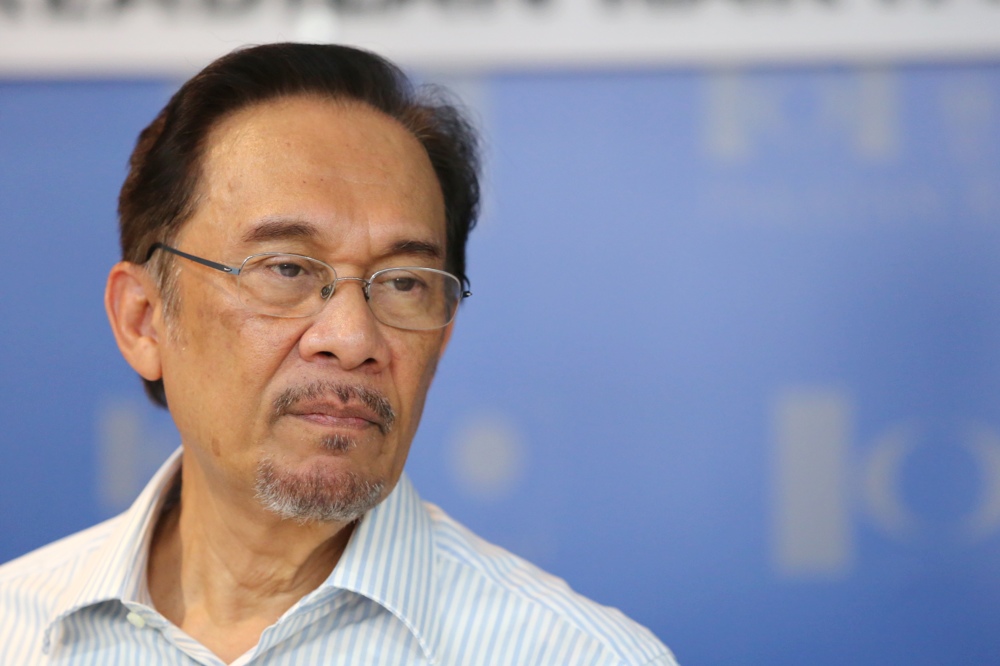KUALA LUMPUR, Oct 12 — PKR de facto leader Datuk Seri Anwar Ibrahim's chances of convincing the Federal Court to reverse the conviction in his second sodomy case are slim, according to criminal law practitioners.
The Federal Court has strict requirements that must be met before it will agree to review its own rulings, the lawyers said while pointing out the low success rates of such applications.
Anwar is today asking the country’s highest court to reconsider its previous decision to uphold the sodomy conviction handed down by the Court of Appeal and the resultant five-year prison sentence.
"The Federal Court rarely does so; doing so would open the floodgates and there would not be any finality to any decision,” Datuk Geethan Ram Vincent told Malay Mail Online yesterday.
"In their review, he (Anwar) will have to prove that a miscarriage of justice has occurred and Anwar Ibrahim's lawyers will have to prove that the previous decision of the Federal Court was tainted with illegality, bias or prejudice.”
Lawyer Datuk Baljit Singh Sidhu said recent decisions showed the Federal Court took a "very conservative approach" for review applications, with apparent reluctance to relook into cases decided by a previous panel of judges.
He explained that the disinclination was likely to avoid clogging up the court system, as a readiness to review past decisions would communicate to applicants that rulings are not final and encourage their challenge.
“Basically the position of the Federal Court is their exercise of review can only be undertaken sparingly and only in rare exceptional circumstances, where there is no alternative remedy available to prevent injustice or to prevent abuse of the court process, so the courts are very stringent on this,” he said.
Given the direction that the Federal Court is taking with review applications, he said Anwar’s application is “unlikely to succeed”.
For bids such as Anwar's that are made under Rule 137 of the Rules of the Federal Court 1995, the rule says the highest court in Malaysia has the inherent powers to hear any application or make any orders to either prevent injustice or to prevent an abuse of court process.
Lawyer Datuk Hazman Ahmad similarly said it was “very rare” for such review bids to succeed, pointing out the need for certainty with the Federal Court’s decision being final in the legal system.
Anwar's review
Anwar was charged with sodomy for the second time in his career in 2008, but was acquitted after a long trial in 2012.
The saga continued, however, when the prosecution pursued the matter to the Court of Appeal, which decided in 2014 to reverse the former deputy prime minister’s acquittal.
The Federal Court rejected his appeal last February 10, upholding his conviction and five-year prison term.
In his April 30, 2015 review application, Anwar's lawyers listed two main grounds on why the Federal Court should review its decision: to prevent injustice and because his conviction was objectively unsafe.
In a court document filed to explain the second claim, Anwar highlighted a statement by the Prime Minister’s Office that was issued minutes after his conviction and before even his lawyers could mitigate.
He claimed this suggested that he did not receive a fair and independent hearing.
Anwar also singled out the conduct of lead prosecutor Tan Sri Muhammad Shafee Abdullah after the Federal Court's February 10 decision, saying that the latter had verbally attacked him while purportedly explaining the case in a roadshow linked to Umno.
One of Anwar's lawyers, Latheefa Koya, said a letter was sent to the Federal Court's registrar last Friday to request that 13 judges be excluded from the panel hearing his case today.
She confirmed that, as of yesterday morning, Anwar's legal team has not received a response on this request regarding the 13 judges who had previously handled matters related to this current sodomy case and an earlier one which he was acquitted of.
What's next
If Anwar's bid today is successful, it could result in his immediate release from prison with the nullification of his conviction and sentence, or it could also see his appeal being heard again before a new set of Federal Court judges, the lawyers confirmed.
A failure to convince the Federal Court of the necessity to review the case would mean the end of the matter, as far as this particular case is concerned.
However Latheefa also confirmed that Anwar has already filed an appeal against the Kuala Lumpur High Court's decision to deny him leave to challenge the Pardons Board's refusal to grant him royal pardon. There is no hearing date yet for this appeal at the Court of Appeal, she confirmed.
US lawyer Kimberley Motley was recently reported as saying that Anwar's legal team may seek for him to be put under house arrest, but Baljit said there was no legal provision in Malaysia to allow for such a move.
Malaysia's laws instead allow for parole where prisoners may be released earlier from prison with certain conditions, but the offence that Anwar was convicted of - Section 377B of the Penal Code — is listed under the Prisons Act's Fourth Schedule as one of the offences disqualified from the parole process.
Prisoners in Malaysia are typically allowed a remittance of their jail terms, where one-third of their jail term is taken off and they are given early release. For Anwar, that would mean he could walk out of prison in 2018, instead of having to serve the entire five-year jail term until 2020.



















